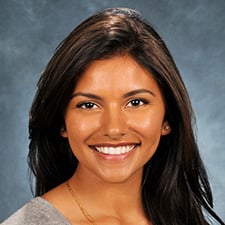Research that examines potential genetic biomarkers of infertility has earned the top prize at the 2022 AMA Research Challenge, beating out nearly 1,200 other entries from medical students, resident physicians and fellows, and international medical graduates in the nation’s largest national, multispecialty research event.
Leelabati “Leela” Biswas, an MD-PhD candidate at Rutgers Robert Wood Johnson Medical School, won the $10,000 grand prize from sponsor Laurel Road for her poster, “Decoding Pregnancy Loss: Validating a Novel Genetic Biomarker of Poor Egg Quality” (PDF).
The three-judge panel that voted on the five posters in the event’s final touted Biswas’ research for its intersectional and translational value to solve a widespread health malady.
“This was a very impressive set of portfolio and techniques that will lead us in the direction of answering a very important question,” said judge Sanjay Desai, MD, the AMA’s chief academic officer.
Addressing infertility
About 10% of U.S. women are diagnosed with infertility. Biswas aimed to further study the problem to find additional factors that contribute to infertility beyond maternal age.
Although maternal age is a key determinant of the formation of chromosomally-abnormal (known as “aneuploid”) eggs, age doesn’t predict egg aneuploidy for all women. So, Biswas sought to identify genetic markers that caused egg aneuploidy independent of maternal age.
To do that, Biswas studied genetic variants enriched in women with high rates of egg aneuploidy relative to maternal age. She tested these genetic variants in mouse eggs. The immediate next step is to further validate these results in our mouse models with additional experimental replicates. Then, Biswas will more deeply explore the molecular mechanisms linking genetic variants and infertility. In the long term, the translation of the research will require analyzing those same biomarkers in a large group of human research subjects.
“The thought is that a physician in the clinic—before [a patient] has decided to get pregnant—sits down with [that patient] ... and does a blood draw, runs a genetic test for biomarkers, combines that with maternal age, and then they can together design a care plan and a pregnancy plan that works for them,” Biswas said during a recent episode of the “AMA Making the Rounds” podcast.
“Maybe that is starting a family earlier if there's somebody who is going to have a lot of aneuploid eggs at an earlier age than you'd expect,” Biswas added. “Or it might be egg donation. It might be IVF. It might be adoption. It's whatever makes sense both clinically and personally for the patient and the physician.”
Stiff competition
The AMA Research Challenge offers young and aspiring physicians a chance to showcase their research on a significant stage. While nearly 1,200 entrants submitted research poster abstracts, about 800 were selected to present posters as part of the virtual event. A semifinal round featured 50 presenters with the top scored research. From that group, a roster of five finalists rose to the top. The overall level of the research made the decision particularly difficult on the panel of three expert judges.
“Everybody is a winner,” said judge Clyde Yancy, MD, vice dean of diversity and inclusion, professor of medicine and medical social sciences, and chief of the cardiology division at Northwestern University Feinberg School of Medicine. “It’s so important to understand at this stage of your research career that the opportunity to have any success in discovery science is a catalytic moment that keeps your career going.”
Biswas was selected as the winner in an event broadcast on YouTube. Upon hearing the news, she was at a loss.
“I’m shocked,” Biswas said. “My heart is beating really quickly. ... I’m very flattered. The research from my colleagues in both the finals and the semifinals was outstanding. It was an incomparable, exciting group of clinicians and student researchers. So, I feel very lucky to be selected as the winner.”
A marquee event
As the largest multispecialty event, the AMA Research Challenge focuses on a diverse range of topics. Projects from the four other AMA Research Challenge finalists focused on AI use in pancreatic cancer detection, audio-visual feedback to improve manual ventilation, and a novel therapeutic target in neuroblastoma.
Each of the five finalists appeared on recent episodes of the AMA’s “Making the Rounds” podcast, which is available on Apple Podcasts, Spotify or anywhere podcasts are available. The episodes offer a glimpse of each of their work and future ambitions.




